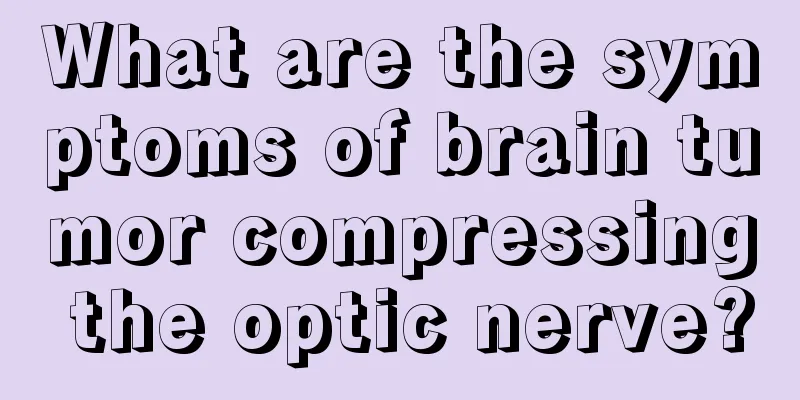What are the symptoms of brain tumor compressing the optic nerve?

|
If a brain tumor compresses the optic nerve, the patient will experience progressive vision loss and will also experience dizziness, headaches, and other phenomena. Many people think that these symptoms are caused by eyestrain, but in fact, this may be a sign of a brain tumor, so it needs to be taken seriously and checked actively. 1. Brain tumor patients will experience progressive vision loss, accompanied by dizziness and headaches, which are often mistaken for eyestrain. If the disease is neglected and misdiagnosed, and medical treatment is sought only after blindness, the brain tumor can be removed surgically, but the possibility of restoring vision is very slim. 2. The human eyeball is like a miniature camera, with a cerebral canal and choroid that are like a darkroom; a pupil that is equivalent to an aperture; a lens that has a focusing function; and a retina that is similar to a photosensitive film. When there is a "failure" anywhere in the eye, optic nerve, and visual center, visual impairment will occur. The optic nerve that governs visual conduction has some nerve fibers that cross left and right as they run in the brain, and the surrounding area is a high-incidence site for pituitary brain tumors and craniopharyngiomas. Because the early symptoms of the tumor are not obvious, once the tumor gradually increases, compression of the optic nerve chiasm can cause optic nerve atrophy, leading to a sudden drop in vision or even blindness. 3. In addition to causing progressive vision loss, brain tumors are often accompanied by visual field defects. In order to see the full picture of objects, patients often need to tilt their heads and squint. Headache is one of the main symptoms. If the tumor is located at the intersection of the optic nerves, the pain is often felt in the bilateral temporal, forehead, back of the orbit, and root of the nose, and is a distending pain. If the headache is severe and accompanied by nausea and vomiting, this indicates that the tumor has entered the late stage of increased intracranial pressure. In short, anyone with decreased vision accompanied by the above symptoms should be given high attention, and efforts should be made to achieve early diagnosis and timely surgery to achieve the possibility of partial recovery of vision. |
<<: What to do if you have mental stress and insomnia
>>: What should not be eaten with King Oyster Mushroom? Four aspects to pay attention to
Recommend
What kind of pain does cervical cancer cause?
Cervical cancer is a particularly common malignan...
Postoperative care measures for bladder cancer
What are the postoperative care measures for blad...
How to eat crispy mango
Every year when mangoes are ripe and available in...
Why does my back feel uncomfortable after eating?
Modern young people are under a lot of pressure, ...
How to switch from breast milk to formula milk
When the baby is still young, parents should try ...
How to plant wolfsbane and what are its effects
Wolfsbane is a very poisonous plant that grows mo...
The role of ether
Ether is a relatively common organic solvent and ...
What is the reason for the redness and swelling of the inner corner of the eye
Redness and swelling at the inner corner of the e...
What are the ways to prevent liver cancer? These methods can effectively prevent liver cancer
How to prevent liver cancer? To prevent liver can...
How to tell if you have hemorrhoid polyps?
Polyp hemorrhoids are also a type of falling from...
What is the cause of bad breath caused by laryngeal cancer
Laryngeal cancer, because it is a malignant tumor...
How do babies bask in the sun in summer
Many people know that sunbathing can supplement c...
What are the causes of testicular cancer
What are the causes of testicular cancer? Patient...
Methods to reduce heat
The main causes of getting angry are some things ...
What are the most common symptoms of pancreatic cancer?
The pancreas is an important part of the human bo...









